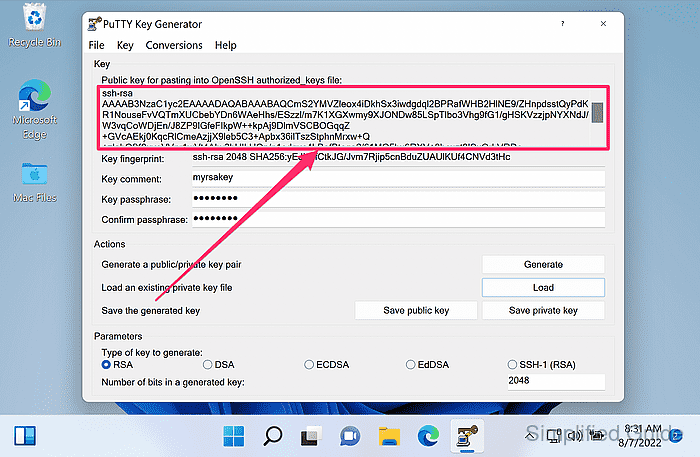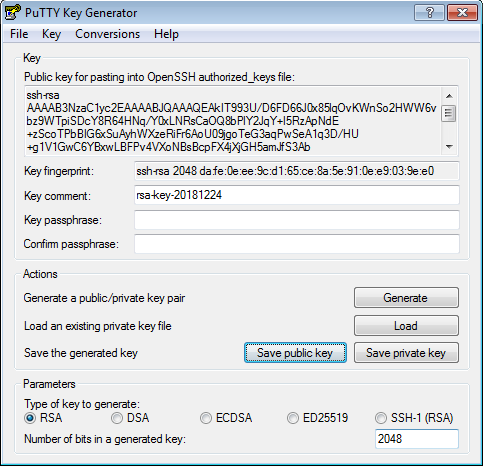This module allows one to (re)generate OpenSSL public keys from their private keys. Keys are generated in PEM or OpenSSH format. The module can use the cryptography Python library, or the pyOpenSSL Python library.
- The.pub file is your public key, and the other file is the corresponding private key. If you don’t have these files (or you don’t even have a.ssh directory), you can create them by running a program called ssh-keygen, which is provided with the SSH package on Linux/macOS systems.
- If you just want to share the private key, the OpenSSL key generated by your example command is stored in private.pem, and it should already be in PEM format compatible with (recent) OpenSSH. To extract an OpenSSH compatible public key from it, you can just run: ssh-keygen -f private.pem -y private.pub.
- Generating the Public Key - Windows 1. At the command prompt, type the following: openssl rsa -in rsa.private -out rsa.public -pubout -outform PEM 2. The public key is saved in a file named rsa.public located in the same folder. Generating the Private Key - Linux 1. Open the Terminal. Navigate to the folder with the.
- As mentioned above, to reuse the PFX/PKCS12 file with OpenSSH, you will need to extract and convert the private key from the PFX/PKCS12 archive in PEM format first, then use ssh-keygen to derive the OpenSSH public key from the private key. I’m not sure why you’re doing all this, but hope the above is.
If you already own an SSH private key but somehow lost your public key, you can regenerate the public key using PuTTYGen (PuTTY Key Generator) if you're using Windows.
Playstation remote play amazon fire stick. Tested this on my Fire TV Stick works well aside from the drop in resolution. Tried to play a game with the OUYA controller; Right Analog and L2/R2 don't work at all during remote play.
PuTTYGen supports both ppk (PuTTY Private Key) and OpenSSH private key format thus you can regenerate the public key for both file formats using PuTTYGen.
Steps to generate SSH public key from existing private key using Puttygen:
Openssh Public Key Format
- Download PuTTY Key Generator (puttygen.exe) from the official website and launch the program.
- Click on the Load button on the lower right of the program.
- Select your private SSH key from where it is locally stored in your system.
PuTTYGen by default filters the file type to just display .ppk format. Click on the select list on the lower right and choose All Files to load files of OpenSSH format.
- Manually copy the public key displayed on PuTTYGen to a text editor and save it to a file to use it on OpenSSH authorized_key file for passwordless login.
- Select the location and file name of the public key and click on Save.
Cloud architect by profession but always consider himself as a developer, entrepreneur and an opensource enthusiast.
Comment anonymously. Login not required.
-->With a secure shell (SSH) key pair, you can create virtual machines (VMs) in Azure that use SSH keys for authentication. This article shows you how to quickly generate and use an SSH public-private key file pair for Linux VMs. You can complete these steps with the Azure Cloud Shell, a macOS or Linux host.
Note
VMs created using SSH keys are by default configured with passwords disabled, which greatly increases the difficulty of brute-force guessing attacks.
For more background and examples, see Detailed steps to create SSH key pairs.
For additional ways to generate and use SSH keys on a Windows computer, see How to use SSH keys with Windows on Azure.
Supported SSH key formats
Azure currently supports SSH protocol 2 (SSH-2) RSA public-private key pairs with a minimum length of 2048 bits. Other key formats such as ED25519 and ECDSA are not supported.
Create an SSH key pair
Use the ssh-keygen command to generate SSH public and private key files. By default, these files are created in the ~/.ssh directory. You can specify a different location, and an optional password (passphrase) to access the private key file. If an SSH key pair with the same name exists in the given location, those files are overwritten.

The following command creates an SSH key pair using RSA encryption and a bit length of 4096:
If you use the Azure CLI to create your VM with the az vm create command, you can optionally generate SSH public and private key files using the --generate-ssh-keys option. The key files are stored in the ~/.ssh directory unless specified otherwise with the --ssh-dest-key-path option. If an ssh key pair already exists and the --generate-ssh-keys option is used, a new key pair will not be generated but instead the existing key pair will be used. In the following command, replace VMname and RGname with your own values:
Provide an SSH public key when deploying a VM
To create a Linux VM that uses SSH keys for authentication, specify your SSH public key when creating the VM using the Azure portal, Azure CLI, Azure Resource Manager templates, or other methods:
If you're not familiar with the format of an SSH public key, you can display your public key with the following cat command, replacing ~/.ssh/id_rsa.pub with the path and filename of your own public key file if needed:
A typical public key value looks like this example:
Openssh Extract Public Key From Private
If you copy and paste the contents of the public key file to use in the Azure portal or a Resource Manager template, make sure you don't copy any trailing whitespace. To copy a public key in macOS, you can pipe the public key file to pbcopy. Similarly in Linux, you can pipe the public key file to programs such as xclip.
The public key that you place on your Linux VM in Azure is by default stored in ~/.ssh/id_rsa.pub, unless you specified a different location when you created the key pair. To use the Azure CLI 2.0 to create your VM with an existing public key, specify the value and optionally the location of this public key using the az vm create command with the --ssh-key-values option. In the following command, replace myVM, myResourceGroup, UbuntuLTS, azureuser, and mysshkey.pub with your own values:
If you want to use multiple SSH keys with your VM, you can enter them in a space-separated list, like this --ssh-key-values sshkey-desktop.pub sshkey-laptop.pub.
SSH into your VM
With the public key deployed on your Azure VM, and the private key on your local system, SSH into your VM using the IP address or DNS name of your VM. In the following command, replace azureuser and myvm.westus.cloudapp.azure.com with the administrator user name and the fully qualified domain name (or IP address):

If you specified a passphrase when you created your key pair, enter that passphrase when prompted during the login process. The VM is added to your ~/.ssh/known_hosts file, and you won't be asked to connect again until either the public key on your Azure VM changes or the server name is removed from ~/.ssh/known_hosts.

Windows Openssh Public Key Location
If the VM is using the just-in-time access policy, you need to request access before you can connect to the VM. Drivers android network & wireless cards. For more information about the just-in-time policy, see Manage virtual machine access using the just in time policy.
Next steps
Openssh Generate Public Key From Private Key
For more information on working with SSH key pairs, see Detailed steps to create and manage SSH key pairs.
If you have difficulties with SSH connections to Azure VMs, see Troubleshoot SSH connections to an Azure Linux VM.
